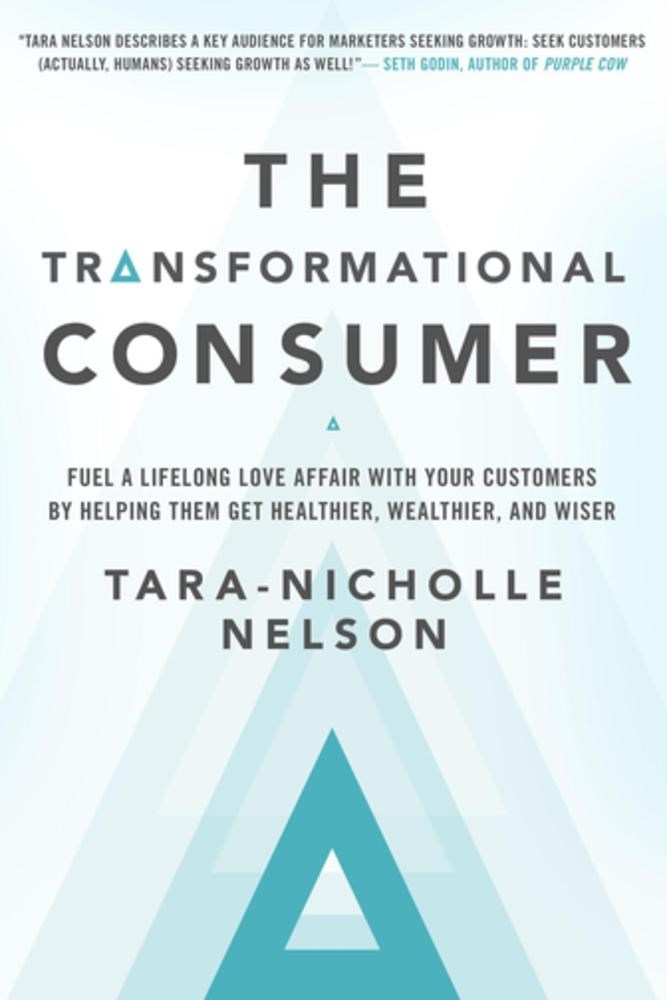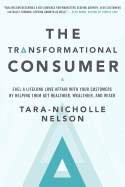The Transformational Consumer: Fuel a Lifelong Love Affair with Your Customers by Helping Them Get Healthier, Wealthier, and Wiser
March 02, 2017
Tara-Nicholle Nelson helps us create life-long relationships with our customers by servicing their aspirations rather than feeding their addictions.

The Transformational Consumer: Fuel a Lifelong Love Affair with Your Customers by Helping Them Get Healthier, Wealthier, and Wiser by Tara-Nicholle Nelson, Berrett-Koehler, 176 pages, $26.95, Hardcover, March 2017, ISBN 9781626568839
We’ve reviewed a lot of books over the years about engaging employees in a larger purpose, how to call on deeper human motivations than a paycheck or profit to inspire more effortful, intentional, and influential work. Most companies simply find it harder to create an environment in which an employee can optimally contribute all they have to offer than it is to create a product for customers to easily consume.
Tara-Nicholle Nelson ups the ante in her new book, The Transformational Consumer, arguing that we should be engaging our customers in a higher purpose, to help them be more effortful and intentional in how they live their lives, to call on their aspirations rather than their addictions. Luckily, that desire already exists; we just have to be willing to meet it.
Understanding how to influence consumer behavior is something the world’s most successful companies have become astoundingly good at. There is an army of large, successful companies in the world who are brilliant at engineering products that we crave. Their products are, in fact, so excellently engineered, so perfectly attuned to our tastes and desires, that they are literally addictive. And yet, most of these products—the junk food in our cupboards, the personal computers in our pockets—are usually things we would like to get away from to some extent, to consume less often. They’re pleasures, but they’re guilty pleasures—transactional hits of instant gratification built upon decades of research into how people naturally behave.
This decades-long campaign to get people addicted … is exactly what people think of when they think of companies trying to create habit-forming products. They think of big, evil conglomerates on a sinister mission to get people addicted to retail, screens, friend feeds, and bad food, while they laugh all the way to the bank.
But people also naturally strive for something more, something fundamentally different. We desperately want to distance ourselves from those more base desires, to overcome them to be healthier, wealthier, and wiser. But what those companies have taught us can be used to influence consumer behavior in more positive ways.
[B]usinesses are in a position to understand how to change and influence people’s behavior, even the hardest ones to change. There’s nothing that says companies can’t wield that influence for good rather than evil. […] What if we aligned our business models with people’s personal goals for themselves, to change their behavior for the healthier, wealthier, and wiser?
First of all, we would go to work every day to improve people’s lives, to help them achieve their goals, rather than with the goal of grabbing as much of their attention and income as possible. You’d get to go to work with a growth mindset that greets challenges with an attempt to expand resourcefulness rather than a fixed mindset intent on capturing limited resources. You’d get to focus on human transcendence rather than individual transactions.
This is how you become great: by transcending the transactional. And how you transcend the transactional is by becoming a force for transformation in the lives of the people you serve.
At the heart of approach is the Transformational Consumer (a full 50 percent of all consumers), and how to connect with them. Nelson will immerse you in her own research and give you rules of thumb to follow in doing your own. It’s often incredibly simple, such as her one rule for customer research: do it, but there is clarity in her research and her writing. Through it, she belies many well-worn arguments in today’s business world. For instance, she emphasizes the importance of content, but dismisses the idea that the solution is to tell more authentic and engaging stories about our brands.
Contrary to conventional business wisdom, engaging these Transformational Consumers is not about telling a story of your brand or your company. It’s about crafting an authentic, relatable, warts-and-all, before-and-after story about them and delivering products and content that help them progress along their journeys. […] It’s about casting them in the role of hero on their own transformational journey and then providing the resources to make this story come true, over and over, for a lifetime.
As a business, your best opportunity for growth is in inspiring and assisting the growth of your customers as human beings. It applies just as assuredly whether you are a carpenter or an insurance agent, a CPA, or a realtor, just as much if you’re marketing soap, selling pharmaceuticals, or making a new fitness app.
And it also changes your view of your competition. One of Nelson’s transformative professional roles was as the VP of marketing for MyFitnessPal, during which she was often asked who she viewed as their competition. Whereas most would look at the competitive landscape their business was in and identify other fitness apps or weight-management programs, she focused on the lives their customers were living and saw something different. Their competition in a customer’s daily life was human biology (which evolved in a way that makes fat and sugars especially desirable and therefore delicious), the billion-dollar advertising budgets of the companies that sell fatty and sugary foods, and the fact that, in our society, it’s simply easier and cheaper to find and eat unhealthy, processed food than it is to prepare healthy meals. And so she focused on helping people overcome those obstacles. She focused on her customer rather than her “competition.”
We’re all trying to figure out how and where to reach people—increasingly online, on social media, or in mobile phone apps. Neslon reemphasizes that where you really reach people is in the real world, in their hearts and minds. You might be able to do that digitally, but the platform is secondary to the core message and motivation you provide. It is about engaging them aspirationally, not electronically.
Engagement is not a digital problem. It is a human problem. And the solution is human, too. Once you understand the powerful motivation of the human drive to live healthier, wealthier, and wiser, clarity will replace confusion about how to connect with people.
Instead of giving people an addictive product, focus on enriching their lives and assisting them in maintaining an effort to do so. Give them assistance that becomes such an important piece of their lives, and so valuable to them, that it becomes indispensible. Help them overcome their inner resistance and reach out for something more progressive, positive, and potentially transformative in their lives. Focus more, and first, on the human problem you’re trying to address in people’s lives, rather than the product. To be truly and sustainably successful, find transformational consumers, and serve them well.


